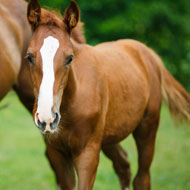Foal born from vitrified immature oocyte in Belgium

Ghent scientists say the cryopreservation of oocytes offers several possibilities in veterinary medicine. (stock photo)
A ‘test tube’ foal has been born in Belgium using two techniques - vitrification and ICSI. Scientists say the birth is a major breakthrough in the field of assisted reproduction in horses.
The stallion, which has been named VICSI after the two techniques used to secure his birth, was born at the Faculty of Veterinary Medicine at Ghent University.
Vitrification is a cryopreservation method that involves cooling the oocytes very rapidly, resulting in the formation of a glass-like structure. For ICSI, or intracytoplasmic sperm injection, micro-manipulation is used to inject a sperm cell into an oocyte.
For this research, oocytes were aspirated from equine ovaries collected at the slaughterhouse. These immature oocytes were vitrified and stored in liquid nitrogen for a week, then maturation of the oocytes was carried out in an incubator following rapid warming. The mature oocytes were fertilised through ICSI and cultured in the incubator for nine days, after which the resulting embryo was transferred to the uterus of a recipient mare.
Ghent scientists say the cryopreservation of oocytes offers several possibilities in veterinary medicine. Freezing immature oocytes offers lots of opportunities for conserving the genetics of rare or endangered equids. Cryopreservation also allows oocytes to be stored and transported for research or clinical purposes.
However, it takes time to optimise a technique to the point that it has practical applications. In this study, only 34 per cent of the vitrified oocytes matures and only 5 per cent of the injected oocytes developed into a good embryo. When fresh oocytes are used, on the other hand, the maturation rate is 60 per cent, and 20 per cent of the fertilised oocytes develops into an embryo that can be transferred to a mare.
Researchers say VICSI’s birth is an important first step towards these practical applications.



 BSAVA is to partner with BVA Live (11-12 June 2026) to champion clinical research.
BSAVA is to partner with BVA Live (11-12 June 2026) to champion clinical research.